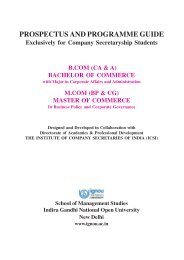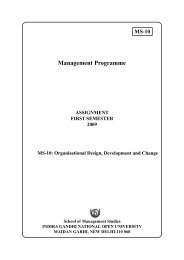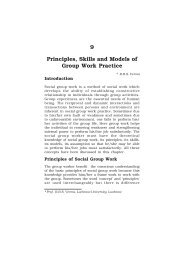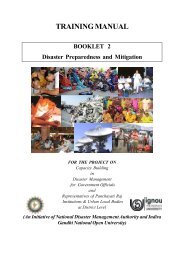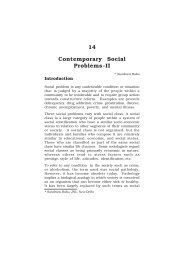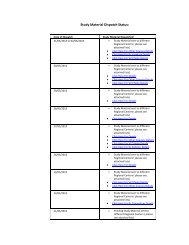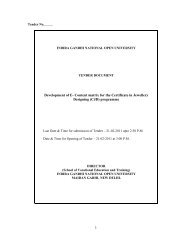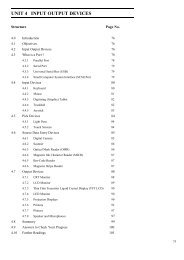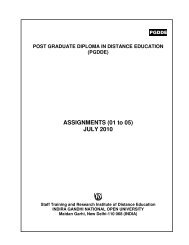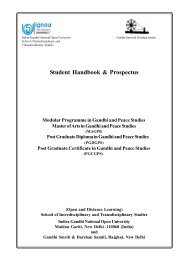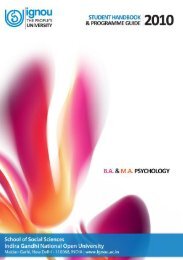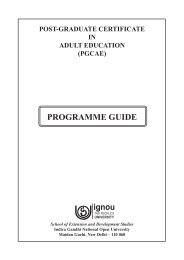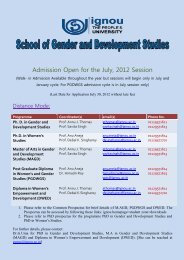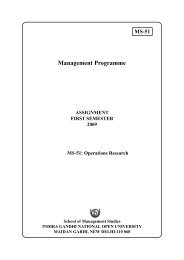- Page 1 and 2:
MINUTES of the THIRTY-SECOND MEETIN
- Page 3 and 4:
Before taking the Agenda items, the
- Page 5 and 6:
AC 32.2.1 AC 32.2.2 ITEM NO.3 AC 32
- Page 7 and 8:
Computer Integrated Manufacturing,
- Page 9 and 10:
Council may also like to suggest so
- Page 11 and 12:
Appendix-1 (To Item No.1) List of M
- Page 13 and 14:
MINUTES of the THIRTY-THIRD MEETING
- Page 15 and 16:
13. Mrs. Rita Sarkar The Chairman t
- Page 17 and 18:
various Regional Centers. AC 33.2.2
- Page 19 and 20:
methodology of PGDDE and MADE immed
- Page 21 and 22:
AC 33.6.2 ITEM NO. 7 AC 33.7.1 that
- Page 23 and 24:
(H.P.Dikshit) Chairman
- Page 25 and 26:
Appendix-2 (To Resolution No.33.3.2
- Page 27 and 28:
Form for the 8-credit elective cour
- Page 29 and 30:
Programmes. 3. To recognize four ye
- Page 31 and 32:
the ‘Wards of Ex-servicemen’ sh
- Page 33 and 34:
Diploma in Civil Engineering (DCLE)
- Page 35 and 36:
cater to the same state. ACSC 12.17
- Page 37 and 38:
Programme Experts have suggested th
- Page 39 and 40:
ITEM NO. 12.26 TO CONSIDER THE ELIG
- Page 41 and 42:
ITEM NO. 12.29 TO REPORT THE MINUTE
- Page 43 and 44:
Appendix-3 (To Resolution No. 33.4.
- Page 45 and 46:
methodology be noted and reported t
- Page 47 and 48:
The following agenda items were tak
- Page 49 and 50:
courses. ITEM NO. 14.3 TO CONSIDER
- Page 51 and 52:
ACSC 14.5.2 The Academic Council's
- Page 53 and 54:
Committee that SOHS has revised the
- Page 55 and 56:
students, who could not exercise th
- Page 57 and 58:
ACSC 14.15.3 The Academic Council's
- Page 59 and 60:
matter in the Task Force, the view
- Page 61 and 62:
ACSC 14.20.4 The Academic Council's
- Page 63 and 64:
The Chairman then requested Prof. S
- Page 65 and 66:
20.12.2001 and the same was also ap
- Page 67 and 68:
ACSC 15.5.1 Prof. S.C.Garg, Pro Vic
- Page 69 and 70:
University is receiving requests fr
- Page 71 and 72:
ITEM NO.13 TO CONSIDER AND APPROVE
- Page 73 and 74:
MPSE-013 in 2 nd year of M.A. (Poli
- Page 75 and 76:
combination of courses for award of
- Page 77 and 78:
the University decided to fill vaca
- Page 79 and 80:
MINUTES of the THIRTY FOURTH MEETIN
- Page 81 and 82:
6. Prof. M.Aslam 7. Dr. Subhasis Ma
- Page 83 and 84:
Purposes for BDP, a new course BWEE
- Page 85 and 86:
10. Modalities of re-submission: (i
- Page 87 and 88:
AC 34.3.3 The Academic Council cons
- Page 89 and 90:
may be recognized University: for a
- Page 91 and 92:
ITEM NO. 8 TO CONSIDER AND APPROVE
- Page 93 and 94:
Appendix-2 (To Resolution No. AC 34
- Page 95 and 96:
ACSC 16.2.2 ACSC 16.2.3 ITEM NO.3 S
- Page 97 and 98:
ITEM NO.6 ACSC 16.6.1 TO CONSIDER A
- Page 99 and 100:
Certificate Programme for Micro Ene
- Page 101 and 102:
ITEM NO.14 ACSC 16.14.1 ACSC 16.14.
- Page 103 and 104:
TABLED ITEM ITEM NO.17 TO REPORT TH
- Page 105 and 106:
Appendix-3 (To Resolution No. AC 34
- Page 107 and 108:
Appendix-4 (To Resolution No. AC 34
- Page 109 and 110:
Appendix-5 (To Resolution No. AC 34
- Page 111 and 112:
ACSC 17.1.2 During the discussion,
- Page 113 and 114:
Newborn and Infant Care and Certifi
- Page 115 and 116:
ACSC 17.8.4 ITEM NO.9 ACSC 17.9.1 A
- Page 117 and 118:
The matter was taken up with the Sc
- Page 119 and 120:
ACSC 17.13.3 ITEM NO. 14 ACSC 17.14
- Page 121 and 122:
• To create understanding of the
- Page 123 and 124:
Appendix-6 (To Resolution No. AC 34
- Page 125 and 126:
(d) Participation & Attendance for
- Page 127 and 128:
Form 2 Evaluation Sheet for Unguide
- Page 129 and 130:
Evaluation scheme for Practical The
- Page 131 and 132:
Theory Courses Credits Laboratory C
- Page 133 and 134:
Block 3 p-Block Elements-II Unit 8
- Page 135 and 136:
6. ORGANIC CHEMISTRY-III Block 1: U
- Page 137 and 138:
Block 2: Spectroscopic Methods-I Un
- Page 139 and 140:
3. To determine the percentage comp
- Page 141 and 142:
12. Chemistry Lab III Block1: Inorg
- Page 143 and 144:
Block 3: Physical Chemistry Lab Ele
- Page 145 and 146:
Block 2 Unit 5 Unit 6 Unit 7 Unit 8
- Page 147 and 148:
Appendix-9 (To Resolution No. AC.34
- Page 149 and 150: The Chairman emphasized that resear
- Page 151 and 152: RC.7.2.4 RC.7.2.5 RC.7.2.6 The repo
- Page 153 and 154: ITEM NO.6 TO CONSIDER AND APPROVE T
- Page 155 and 156: RC.7.10.3 The Research Council disc
- Page 157 and 158: ITEM NO.14 TO CONSIDER AND APPROVE
- Page 159 and 160: 8. Where a meeting of the Council h
- Page 161 and 162: Item No.3 The Equivalence Committee
- Page 163 and 164: Item No.12 Recommended not to accep
- Page 165 and 166: MINUTES of the THIRTY FIFTH MEETING
- Page 167 and 168: 5. The University implemented many
- Page 169 and 170: 2. Approved direct admission of PGD
- Page 171 and 172: NCIDE playing a central role. AC 35
- Page 173 and 174: As per the policy of the University
- Page 175 and 176: AC 35.8.2 ITEM NO.9 AC 35.9.1 The A
- Page 177 and 178: ITEM NO. 12 AC 35.12.1 AC 35.12.2 I
- Page 179 and 180: minimum of two years of BCA/MCA cou
- Page 181 and 182: and made the following recommendati
- Page 183 and 184: initially from the Certificate in C
- Page 185 and 186: estimation and quantity surveying r
- Page 187 and 188: MINUTES of the THIRTY SIXTH MEETING
- Page 189 and 190: The Member- Secretary then presente
- Page 191 and 192: 4. Prof. Santosh Panda, Director, S
- Page 193 and 194: ITEM NO. 3 To consider and approve
- Page 195 and 196: ITEM NO.6 To consider the Award of
- Page 197 and 198: It may be pointed out that no histo
- Page 199: igorous process of material develop
- Page 203 and 204: were to be taken up in the Parliame
- Page 205 and 206: further directed that: i) non-recur
- Page 207 and 208: In case a learner desires a Certifi
- Page 209 and 210: MINUTES of the THIRTY SEVENTH MEETI
- Page 211 and 212: ITEM NO. 2 AC 37.2.1 AC 37.2.2 AC 3
- Page 213 and 214: Social Work and Diploma in Value Ad
- Page 215 and 216: (ii) (iii) However, students who we
- Page 217 and 218: form would remain unchanged as is f
- Page 219 and 220: observed that such courses can be o
- Page 221 and 222: Sh. K.D.Sharma, Section Officer, Ac
- Page 223 and 224: IGNOU MINUTES OF THE THIRTY EIGHTH
- Page 225 and 226: ITEM NO. 2 AC 38.2.1 AC 38.2.2 AC 3
- Page 227 and 228: IGNOU MINUTES OF THE THIRTY NINTH (
- Page 229 and 230: AC 39.1.1 The Chairman informed tha
- Page 231 and 232: The ACSC further resolved that a Co
- Page 233 and 234: The same have been approved by the
- Page 235 and 236: approved by the Vice-Chancellor. A
- Page 237 and 238: IGNOU MINUTES OF THE FORTIETH MEETI
- Page 239 and 240: ITEM NO. 3 TO CONFIRM THE MINUTES O
- Page 241 and 242: All these committees have stood by
- Page 243 and 244: ITEM NO. 30 TO CONSIDER AND APPROVE
- Page 245 and 246: still are not in position to comple
- Page 247 and 248: MINUTES of the FORTY FIRST MEETING
- Page 249 and 250: At the outset, The Chairman welcome
- Page 251 and 252:
meeting held on May 22, 2007. The A
- Page 253 and 254:
corrigendum about Item No. 39 had a
- Page 255 and 256:
iv) for Legal Literacy programme, p
- Page 257 and 258:
ITEM NO. 9 To ratify the action tak
- Page 259 and 260:
ITEM NO. 12 AC 41.12.1 AC 41.12.2 I
- Page 261 and 262:
The matter has been examined by the
- Page 263 and 264:
session. AC 41.17.2 The proposal wa
- Page 265 and 266:
AC 41.20.2 The Academic Council rat
- Page 267 and 268:
4. Amb. K.Sreenivas, Former Foreign
- Page 269 and 270:
ITEM NO. 25 AC 41.25.1 To consider
- Page 271 and 272:
MINUTES of the FORTY SECOND MEETING
- Page 273 and 274:
24. Dr. S.S. Rathi, University of D
- Page 275 and 276:
proposal for creation of two separa
- Page 277 and 278:
to a pool of elective courses in th
- Page 279 and 280:
y the School Board of School of Edu
- Page 281 and 282:
prescribed by the Vice-Chancellor f
- Page 283 and 284:
Also, by addressing women learners,
- Page 285 and 286:
on the same conditions as approved
- Page 287 and 288:
MINUTES of the FORTY THIRD MEETING
- Page 289 and 290:
58. Prof. Kamlesh Mohan - Member 59
- Page 291 and 292:
Budget and Accounting for PRIs, Cer
- Page 293 and 294:
Following the discussion, the Chair
- Page 295 and 296:
the same provision may be extended
- Page 297 and 298:
IGNOU MINUTES OF THE FORTY FOURTH M
- Page 299 and 300:
ITEM NO. 2 Minutes of its 43 rd Mee
- Page 301 and 302:
AC 44.5.3 affiliation requires a th
- Page 303 and 304:
AC 44.8- 10.2 ITEM NO.11 Board of S
- Page 305 and 306:
Committee Meeting regarding IGNOU-S
- Page 307 and 308:
MINUTES of the FORTY FIFTH MEETING
- Page 309 and 310:
Kapur, Prof. Arvind Kumar, Prof. S.
- Page 311 and 312:
AC 45.3.3 ITEM NO. 4 AC 45.4.1 AC 4
- Page 313 and 314:
Chancellor present at the Meeting t
- Page 315 and 316:
AC 45.8.2 Prof. Anu Aneja, Director
- Page 317 and 318:
also informed that the course ‘ME
- Page 319:
Sri Aurobindo. Accordingly, the Sch
- Page 323 and 324:
IGNOU MINUTES OF THE FORTY SIXTH ME
- Page 325 and 326:
the decision in resolution No. AC 4
- Page 327 and 328:
• Rounding off decimal point in t
- Page 329 and 330:
ITEM NO. 4 To consider co-option of
- Page 331 and 332:
launching of the Programmes. He ask
- Page 333 and 334:
AC 46.9.1 It was presented that the
- Page 335 and 336:
through the School of Interdiscipli
- Page 337 and 338:
ITEM NO.19 To consider and approve
- Page 339 and 340:
ITEM NO.25 AC 46.25.1 AC 46.25.2 AC
- Page 341 and 342:
proposal. AC 46.29.3 ITEM NO.30 AC
- Page 343 and 344:
The Vice-Chancellor considered and
- Page 345 and 346:
programmes in detail and informed t
- Page 347 and 348:
AC 46.39.3 The Academic Council rat
- Page 349 and 350:
AC 46.44.1 It was presented that th
- Page 351 and 352:
Visual and Performing Arts comprise
- Page 353 and 354:
IGNOU MINUTES OF THE FORTY SEVENTH
- Page 355 and 356:
Humanities, University of Hyderabad
- Page 357 and 358:
MINUTES of the FORTY EIGHT MEETING
- Page 359 and 360:
IGNOU MINUTES OF THE FORTY EIGHTH M
- Page 361 and 362:
University, Hong Kong Open Universi
- Page 363 and 364:
AC 48.3.3 ITEM NO. 4 AC 48.4.1 AC 4
- Page 365 and 366:
‘Diploma in Information and Assis
- Page 367 and 368:
graduation, and it is to some exten
- Page 369 and 370:
AC 48.15.3 ITEM NO.16 AC 48.16.1 AC
- Page 371 and 372:
programme. ITEM NO.20 To report on
- Page 373 and 374:
ITEM NO.23 To consider and approve
- Page 375 and 376:
AC 48.25.2 AC 48.25.3 Prof. Bimla K
- Page 377 and 378:
programmes and explained that an ex
- Page 379 and 380:
MAIDAN GARHI, NEW DELHI-110068
- Page 381 and 382:
38. Dr. K. V. Peter - Member 39. Pr
- Page 383 and 384:
AC 49.4.1 AC 49.4.2 ITEM NO. 5 AC 4
- Page 385 and 386:
AC 49.6.4 AC 49.6.5 ITEM NO.7 AC 48
- Page 387 and 388:
ITEM NO.10 AC 49.10.1. AC 49.10.2 A
- Page 389 and 390:
AC 49.16.1 The 13 th Meeting of the
- Page 391 and 392:
AC 49.19.3 ITEM NO.20 AC 49.20.1 Th
- Page 393 and 394:
AC 49 .21.3 The Academic Council ra
- Page 395 and 396:
after successful completion of firs
- Page 397 and 398:
IOCG approach. v) Establishing the
- Page 399 and 400:
Fashion Merchandising and Productio
- Page 401 and 402:
presented that, as per criteria for
- Page 403 and 404:
ITEM NO.39 AC 49.39.1 AC 49.39.2 IT
- Page 405 and 406:
ITEM NO.43 AC 49.43.1 To consider a
- Page 407 and 408:
all those who seek it. AC 49.44.3 T
- Page 409 and 410:
• Availability and use of existin
- Page 411 and 412:
MINUTES of the FIFTIETH MEETING of
- Page 413 and 414:
IGNOU MINUTES OF THE FIFTIETH MEETI
- Page 415 and 416:
AC 50.1.2 It was presented that the
- Page 417 and 418:
a Policy in place for Affiliation/m
- Page 419 and 420:
AC 50.6.2 AC 50.6.3 ITEM NO.7 AC 50
- Page 421 and 422:
AC 50.8.2 ITEM NO. 9 AC 50.9.1 AC 5
- Page 423 and 424:
network of 60 Regional Centres, at
- Page 425 and 426:
AC 50.16.1 AC 50.16.2 It was presen
- Page 427 and 428:
Education (RIVET-EZ). Prof. Pandav
- Page 429 and 430:
Association of India Educational Tr
- Page 431 and 432:
look into the details of the scheme
- Page 433 and 434:
INDIRA GANDHI NATIONAL OPEN UNIVERS
- Page 435 and 436:
60. Prof. L. Venugopal Reddy, - Mem
- Page 437 and 438:
approved the proposal for creation
- Page 439 and 440:
AC 51.3.2 During the discussions th
- Page 441 and 442:
programmes in specific domains/area
- Page 443 and 444:
was approved by the 5 th School Boa
- Page 445 and 446:
and PG Programmes in the discipline
- Page 447 and 448:
Agriculture. Prof. K.R. Srivathsan
- Page 449 and 450:
AC 51.22.1 AC 51.22.2 Criminal Just
- Page 451 and 452:
ITEM NO.24 Action Taken on Item No.
- Page 453 and 454:
maintenance of study centre is the
- Page 455 and 456:
Training had submitted the Phase 3
- Page 457 and 458:
mode approach. The modular approach
- Page 459 and 460:
(V.N.Rajasekharan Pillai) Chairman
- Page 461 and 462:
IGNOU MINUTES OF THE FIFTY SECOND M
- Page 463 and 464:
ITEMNO. 1(A) To confirm the minutes
- Page 465 and 466:
Participating in the discussions th
- Page 467 and 468:
1) Keeping in view the above it is
- Page 469 and 470:
ITEM NO. 6 AC 52.6.1 AC 52.6.2 AC 5
- Page 471 and 472:
ITEM NO. 9 AC 52.9.1 AC 52.9.2 To R
- Page 473 and 474:
AC 52.11.3 ITEM NO. 12 AC 52.12.1 T
- Page 475 and 476:
AC 52.14.2 AC 52.14.3 ITEM NO. 15 A
- Page 477 and 478:
AC 52.18.3 ITEM NO. 19 AC 52.19.1 A
- Page 479 and 480:
3. A separate brochure for the sche
- Page 481 and 482:
ITEM NO. 22 AC 52.22.1 To consider
- Page 483 and 484:
constituted for the purposed and th
- Page 485 and 486:
sustainability, social sustainabili
- Page 487 and 488:
AC 52.30.2 AC 52.30.3 ITEM NO. 31 A
- Page 489 and 490:
AC 52.34.2 ITEM NO. 35 AC 52.35.1 T
- Page 491 and 492:
AC 52.37.2 AC 52.37.3 During the di
- Page 493:
2. PROPOSED PROCESS OF CONDUCTION O



